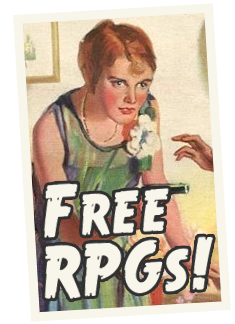World Creation Part 4: I, For One, Welcome our New Robot Underlings
Welcome to the fourth installment of the World Creation Series. If you are only now tuning in to the series, and want to be in a position to claim it has jumped the shark, here are the first, second, and third entries.
Now that the practical aspects of the setting have been established (the major government bodies, the technology level, etc) it is time to settle down and take a closer look at how some major details will be implemented.
First, we have robotics. I want to have some sort of mechanized humanoid semisentient thing in this setting, if only because it seems like it would fit into the setting so far. The government I’ve established is one where technology is used to better the situation of humanity, where a broken world is kept precariously together by the mastery and use of creative engineering. Robotics seems to be the ultimate extension thereof: creating sophisticated, almost intelligent beings to serve mankind.
It follows, then, that robots would be more or less totally subservient. From the most crude worker drone to the most sophisticated secretary/accountant bot, every artifice has a master to serve and a task to do. Plausibly, even the most complex will probably have only the barest semblances of a personality, and the resemblance to a human will probably fall apart under close scrutiny (they won’t panic when shot at, get tired after working for a day without rest, or get lonely when left alone for weeks). Some high engineers (“high artists”) create sophisticated, nuanced personalities as a display of skill and panache, but even these are distinctly inhuman and probably the less practical for their simulated emotions.
Robots are used primarily for labor that requires more finesse than a factory machine, but is somehow undesirable to humans. For example, robots are used as sewer workers, combination secretary/accountant for bureaucrats, executioners, etc. However, this tendency towards an automated labor force is hardly universal. In the inner cities, where there are the universities, government buildings, and high concentrations of high artists, there are plenty of robot workers. In the mid-cities, used to transport resources and just to provide concentrations of people, there are probably the occasional robot, mostly either legacy bots that have been in government possession for a while or personal employees of wealthy individuals. In the outer cities, robots are scarce, with perhaps one or two to serve as curiosities, rusting old machines that wander apologetically through the streets, having long forgotten what they were built for.
We come next to the issue of religion. Obviously, this is a pretty significant part of any civilization. Religion is a unifier, a motivator, and an influence on all parts of the typical culture. As such, the religion for this realm needs to be something that preserves the general flavor.
Like most real-world religions, the belief system of this world states that the body is basically a fancy, organic machine that houses the soul. According to this belief system, humans have evolved to the point where we are smart enough to create machines of our own, but even these artifices pale in comparison to the genius engineering of the human body. Our cell structure and our organs are wondrous, complex devices that cannot be fashioned of iron or cogs, no matter how minutely worked.
However, these bodies have a problem that all machines face. Namely, they degrade and die, and the souls they carry are lost to some ethereal waiting room. The purpose of mankind is to find a way to preserve the soul’s presence in the land of the living eternally, a goal which nonbelievers doubt will ever be reached.
The government is largely founded on this belief, and almost all the ruling council are devout. It does not, however, enforce these beliefs in any way—there doesn’t seem to be a point, since most of the common folk wouldn’t really do anything with these beliefs anyway.
There are two levels within the church. There are the Artificers, high artists and scholars who work to study the human body and the workings of machines, compiling knowledge in an endless quest to create a perfect, nondegrading human body. These represent a fraction of a percent of the population, and work mainly outside the public eye. Below the Artificers are the common “priests”, known as Warders. Warders serve many small functions: they heal the sick, set wounds, and generally preserve individual human existence. Essentially, the religion deals with the unreachable and the pragmatic, the betterment of the soul and the care of the body.
Morality is communicated through the Warders, who sometimes act as community leaders. Warders teach that the soul and body are both precious, and are not to be abused in any way. The abuse of substances and the neglect of personal health are considered sinful, along with crimes such as assault and murder. Theft is treated as a light offense, punishable but peripheral to the major concerns of the faithful.
Tune in next week for a debate that might severely impact the functioning of the world: Magic, or No Magic?







I expected more intertwining of religion and politics. As to magic, if you have sufficiently advanced technology, why would you need magic?
Shim:
I seriously considered the issue, and I really should have mentioned my conclusion in the body of the article.
To summarize, I decided that I wanted this government to appear a little more benevolent than the standard control-everything empire. Really, they just want to diversify resources and maintain the status quo–almost more of a corporation than a dictatorship. While the religion is important to many of the councilors, and may even be the reason why they play along in the first place (to gain the resources to conduct experiments) they see no point in using it as a tool of control.
As to the second point: to answer seriously, because it might fulfill a certain important niche. More on that next week.
[…]Like most real-world religions, the belief system of this world states that the body is basically a fancy, organic machine that houses the soul.[…]
Gnosticism gives you a high five. Pauline theology and most of modern Christianity would like to have a polite word with you.
It amazes me how far this perception has spread throughout modern western culture, despite the great influence from traditional Christianity which does not hold that the body is a biological machine. To Pauline doctrine, the body is an essential part of your being. Even if your soul was removed from your body and placed in another, the result would not be you.
Paul believed strongly in a physical, bodily resurrection for these reasons (and others.) The imperative to keep your body clean for it is partly stemmed from the belief that this physical body would be the one you would get in the afterlife.
I’m attending a Catholic college. I get to learn stuff like this so they’ll give me a fancy piece of paper and some accreditation.
Well, to be fair, note that I did say “most real-world religions”.
This doesn’t even have to include most of Christianity to be correct. A lot of current and historical religions do hold this belief.
It’s funny how learning something can make you act like a wagon full of shaken sodas, poorly separated baking soda and vinegar confined in a small space, and nitro-glycerin: ready to explode at the slightest tap.
I hear you, trust me.
I remember spending 3 minutes on an MMO chat lecturing some guy on the use of the informal Spanish mandative form, until someone threw an e-shoe at my head to shut me up.
Waitwaitwait. Since when does it make sense for there to only be /one/ religion?
Of course, there’s more than one. I was just talking about the most prevalent one, the one that most government officials belong to, the one that has the most effect on society.
Even within the main cities, there’s plenty of folk religions, monastic sects, and cults. I just didn’t want to get into each and every one of them yet.
Obviously, OUTSIDE the empire, there’s even more diversity.
Fair enough.